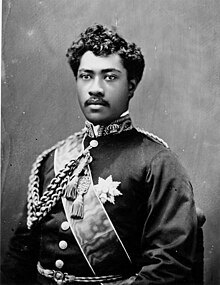William Pitt Leleiohoku II
| Leleiohoku II | |||||
|---|---|---|---|---|---|
| Crown Prince of the Hawaiian Islands | |||||
 |
|||||
| Born |
January 10, 1854 Honolulu, Oʻahu, |
||||
| Died | April 9, 1877 (aged 23) Honolulu, Oʻahu, |
||||
| Burial | April 25, 1877 Mauna ʻAla Royal Mausoleum |
||||
|
|||||
| House | Kalākaua | ||||
| Father | Caesar Kaluaiku Kapaʻakea | ||||
| Mother |
Analea Keohokālole Ruth Keʻelikōlani (hānai) |
||||
| Signature | |||||
| Full name | |
|---|---|
| William Pitt Leleiohoku II Kalahoʻolewa |
Prince William Pitt Leleiohoku II, born William Pitt Kalahoʻolewa (1854–1877), was a prince of the Kingdom of Hawaiʻi and member of the reigning House of Kalākaua. He is remembered for composing the song "Kāua I Ka Huahuaʻi", which was used in the American popular song, "Hawaiian War Chant".
He was initially named Kalahoʻolewa meaning "the day of the funeral" in Hawaiian because his birth coincided with the funeral of King Kamehameha III. He was the youngest brother of James Kaliokalani, David Kalākaua, Liliʻuokalani, Anna Kaiulani, Kaʻiminaʻauao, and Miriam K. Likelike. Shortly after his birth he became the hānai (adopted son) of Princess Ruth Keʻelikōlani who named him after her late husband High Chief William Pitt Leleiohoku. Leleiohoku means "Fled in the time of Hoku" in Hawaiian and commemorates the day Kamehameha I died on the Hawaiian calendar. Princess Ruth also named Leleiohoku II heir to her vast holding of most of the Kamehameha lands but he predeceased her. He was educated at the present day ʻIolani School, which was called the Saint Alban's College at the time. At this school, he developed a close friendship with Curtis P. Iaukea, who later served as an aide during his time as prince. An accomplished musician, Leleiohoku founded several royal choral societies including the Kawaihau Glee Club.He was named the Crown Prince by his brother Kalākaua in 1874, with the consent of the House of Nobles and granted the title of Prince and style of "His Royal Highness". He became a member of the Privy Council and House of Nobles. When Kalākaua visited the United States in 1874, Leleiohoku ruled as regent.
...
Wikipedia
